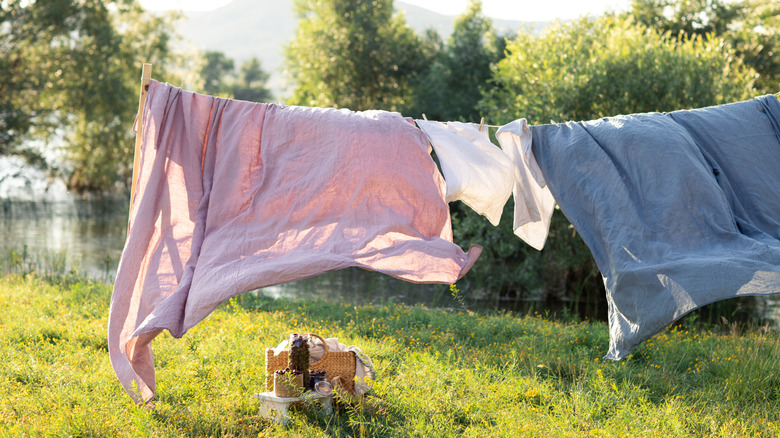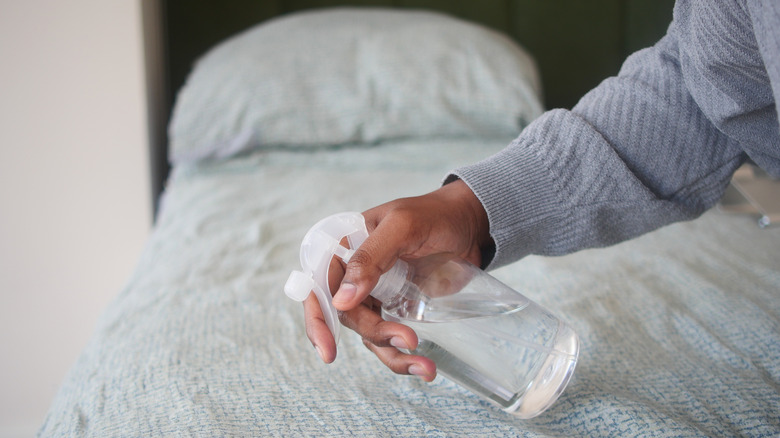How To Freshen Comforters Without Washing
There is hardly a better feeling than crawling into freshly-washed bedding, all fluffed up and smelling amazing. But let's be honest, washing those huge comforters or quilts can be a major pain, and washing too frequently can actually wear down the fabric faster. So is it possible to get that wonderful freshness between regular washes? Well, while your duvet cover or comforter does really need to be fully washed every few weeks, there are certainly options for achieving fresher, cleaner-smelling bedding between washes.
Depending how much time you have to devote to your comforter refresh project — several hours or just a few minutes? — there are many ways to deodorize, sanitize, condition, de=-rinkle, or fluff up your bedding. Let nature or baking soda do the work for you over the course of a day or use a quick fabric spray to get the job done in seconds. Or perhaps let your dryer, steamer, or iron make quick work of wrinkles and add a lovely scent. Depending on what your bedding needs and how much time you have, these tips will work to refresh your comforter before it is due for its next washing.
Cleaning your comforter (without washing it) with a few hours to spare
If you are not in a time crunch, there are a few great ways to refresh fabric between washes over the course of several hours. The easiest is to take advantage of nature: Hang your comforter outside for a few hours on a sunny, dry day (bonus points for a nice breeze). The fresh air will help deodorize, while the sun's UV rays will help kill bacteria. Make sure the comforter is spread out so all areas get to reap the benefits of the outdoors, flipping it over halfway through its outdoor sunbath if it is doubled over on the clothesline or if you had to lay it flat.
The second effective way to eliminate odors and freshen the duvet without washing is to look to a favorite natural deodorizer, baking soda. The baking soda will pull any lingering odors and moisture out of your comforter while you go about your day. Simply sprinkle the baking soda over the comforter and let it sit for an hour or, better yet, several, as it can take a while to do its thing. After a few hours, vacuum off the baking soda (just shaking it off can leave a thin layer behind, which can irritate skin), flip the comforter, and repeat on the other side for a deodorized duvet. This baking soda method also works like a charm as a chemical-free way to clean and deodorize your mattress to use on the day your comforter and sheets are getting a full wash.
Freshening the duvet in under 30 minutes
But what if you don't have hours to refresh your comforter? Perhaps you have company coming or you waited until later in the day to tackle your refresh. Don't stress –- there are several ways to get fresh bedding in under a half hour. The first is to make a scented ironing water to use in your steam iron or fabric steamer using water, essential oils, and either witch hazel or vodka. Following instructions from the manufacturer (there may be a separate reservoir for essential oils), add the mixture to your iron or steamer to remove wrinkles and leave your iron-safe comforter smelling like a dream.
Your scented ironing mixture could also be put into a spray bottle and used as a fabric spray instead of messing with the iron if you're really low on time. Other DIY fabric and upholstery cleaning sprays substitute the witch hazel or vodka with distilled white vinegar for the same antibacterial effects, while others add in baking soda for extra deodorizing power. Finally, try diluting your favorite fabric softener to create a spray to condition and make the duvet smell lovely. You can also purchase a premade fabric refresher, linen spray, or fabric sanitizer if you prefer not to DIY.
The last option for refreshing your quilt in a short period of time would be to toss it in the dryer for 20 to 30 minutes with some tennis or wool dryer balls to fluff it up and remove wrinkles. Shake out the fluffed-up duvet, adding scented fabric spray afterwards if desired. While regular washing is still necessary for your comforter or duvet, keep these tips handy for the next time your bedding needs a refreshing mid-cycle boost.


